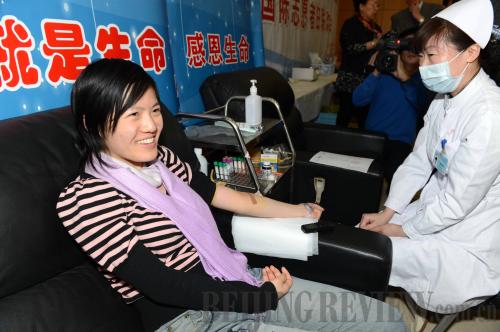|
 |
|
ROLE MODEL: Hou Yifan, Women's World Chess Champion, donates blood at the Beijing Red Cross Blood Center on February 27, when she turned 18, the eligible age for a person to donate blood in China (GUO YONG) |
Ren Xuemei, Director of the Emergency Department at Beijing Chaoyang Hospital, revealed that tighter restrictions have been imposed on the use of blood. As a result, patients can only be given transfusions if they are suffering from life-threatening illnesses.
At the same time, blood banks in Nanjing, capital of eastern Jiangsu Province, have capped supplies to the city's hospitals, resulting in an acute shortage of type-A and type-O blood. It's reported blood banks in the city can meet at most one third of demand.
Shortly after the Guo Meimei scandal, Larry H. P. Lang, a Hong Kong-based economist, wrote on his micro-blog that he suspected the RCSC of receiving free blood donations but selling them to hospitals at a high price.
Since then, the oft-repeated phrase "donating blood doesn't cost money, but using blood costs money" has become a common manifestation of public distrust.
Web portal Sina.com conducted an online survey in 2011. Nearly half of the 6,800 respondents said they were concerned that their blood would be used to make money.
"If my blood is used to make a profit, I will definitely not donate money," said Zhang Nana, a college student at the Renmin University of China in Beijing.
But Tian Xihui, a spokeswoman for the Beijing Red Cross Blood Center, said the public has misunderstood the blood supply system. "The patients actually pay for the testing, transportation and storage procedures, not the blood itself," she said.
China's Blood Donation Law specifies that blood costs are broken down into two parts, covering operational costs of blood donation centers and blood tests and storage in hospitals.
Tian revealed that blood testing includes many items, such as cross-matching before it's used. First of all, workers at mobile blood donation units conduct a medical consultation to exclude people who are not eligible to donate blood, and then they do a preliminary test to examine whether the donated blood is good. After the blood is sent to a blood center, lab technicians will do a comprehensive blood test that covers twice as many items as the preliminary one.
"Hospitals are always blamed for charging money, but the standard price for using 200 cc of blood in China is 220 yuan ($35), which just covers the cost," Tian said. "It is really necessary to show the public clearly the process and the costs from the moment blood is donated to when it is transfused."
Professor Sun believes health authorities are primarily to blame for the public's distrust in the blood supply system, which he said has been focusing more on the techniques of blood collection than the transparency of blood centers' operations.
He suggests that the law on blood donation should be updated." China's blood donation law, since being put into practice in 1998, has not been modified for 14 years. Many articles do not conform to current situations."
According to the Blood Donation Law, a donor as well as his or her relatives are eligible to receive a volume of blood that is the same or greater than the amount he or she has donated free of charge. But blood donors sometimes find it difficult to receive this benefit if they donate blood in one place and undergo a surgery somewhere else.
In fact, different places have different rules on how blood donors can benefit from donation. In Shenzhen in southern Guangdong Province, as long as a person donates 200 cc of blood once, he or she can receive as much free blood whenever necessary throughout their life. In Shanghai, after a person donates 200 cc of blood, he or she can consume 1,000 cc for free within five years. After five years, he or she can use only 200 cc for free.
Furthermore, the blood donation system is still separate from medical insurance programs in China, which causes difficulties for donors to get refunds for using blood themselves.
To meet the current blood demand in China, the Ministry of Health estimates that 70,000 people need to donate blood daily. By 2015, that figure is expected to surge to 120,000 people.
On January 8, the RCSC organized blood donation campaigns in Beijing and called for emergency measures such as blood drives in Beijing and provinces of Yunnan, Shandong, Jilin, Hubei and Guangdong.
Health Minister Chen Zhu, along with nearly 500 people from the Ministry of Health, donated blood that day in hopes of encouraging others.
Some mobile blood donation units in Beijing also prolonged their working hours and provided fruit and juice to donors.
"China's population base is very big and we should focus more on inspiring more eligible people of the right age to donate blood, so as to meet the increasing demand," said Deng, who said that the government planned to widen the age range of healthy citizens eligible for blood donation.
Email us at: yuanyuan@bjreview.com | 